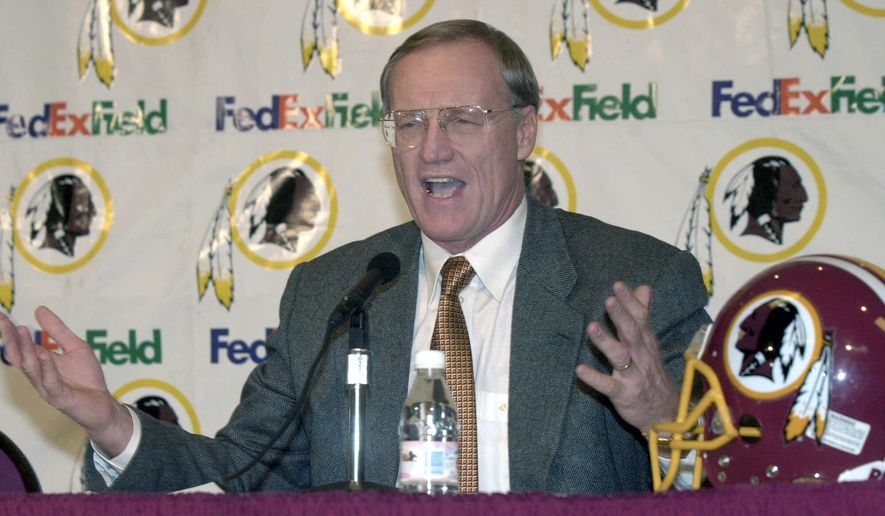If success is relative, there may be no greater example than the past 20 years of the Washington Football Team franchise.
Fans are still basking in the glow of Ron Rivera’s inaugural 7-9 NFC East championship season, and particularly in the team’s impressive playoff loss to the eventual Super Bowl champion Tampa Bay Buccaneers.
Look, under the Dan Snyder regime, folks around here have learned: You take your feel-good moments when you can.
Which in part explains the longstanding fondness many feel for 2001’s 8-8 team, and the esteem in which the coach of that team, Marty Schottenheimer, is held to this day.
The legendary NFL coach passed away Monday night at the age of 77 of Alzheimer’s. Schottenheimer will never be forgotten in cities like Cleveland, Kansas City and San Diego, where he won tons of regular-season games only to come up frustratingly short in the postseason.
But in Washington, where he coached for just one season, he is remembered as a brief, flickering light of promise in a dark, two-decades-long storm of Snyder-authored dysfunction.
Fans here know the story. It’s been handed down from one generation to the next, including the current Rivera-philes, who see the current coach as a franchise savior.
In 2001, like now, the savior was an old-school coach who was in charge of all football decisions.
There was the 0-5 start, followed by the 8-3 finish with journeyman quarterback Tony Banks behind center and the hope that Schottenheimer was starting to build a winner.
It lasted one season.
Fans have lived with the dreams of what might have been since 2001. They are not alone. So have some of the players from that Schottenheimer team.
“The players, we were really looking forward to the next year,” said David Terrell, a safety from that squad. “Toward the end of the year, we really felt good about ourselves and where we were heading, and that was all because of Marty and what he brought, the atmosphere he created there.”
Fellow safety Sam Shade says losing Schottenheimer was pivotal for the franchise.
“Marty had done a great job and felt like we were turning the corner,” he said.
Schottenheimer, who had inherited a country-club atmosphere from fired coach Norv Turner, came down hard on the team when he took over, all with the idea of — guess what — changing the culture.
Not everyone was a fan. Hall of Fame veterans Darrell Green and Bruce Smith balked at the hard-core coaching methods.
“There was some pushback from some guys,” Shade said. “Marty would push back when players pushed back.”
“Some of the veterans weren’t used to this drill sergeant way of coaching,” Terrell said. “But Marty didn’t change. He stayed the same. And it worked. His system worked. And once the team bought in, you could really feel the team behind Marty. I think he kind of grew on the team. I think he had some of us from the start, but then I think he kind of grew on the rest. We just wanted to go out and play for him.
“I was going to run through a wall for him,” Terrell said. “He made you feel that way.”
Snyder didn’t feel the same way.
After getting Schottenheimer, who had been a public critic of the owner, to take the job and giving him the decision-making power, Snyder reportedly chafed at being out of the loop. He clashed with Schottenheimer, and despite the successful finish in 2001, fired the coach with three years and $10 million left on his contract.
“The issue we could not resolve was the process of selecting players to make up the Washington Redskins roster,” Schottenheimer told reporters.
That may have been. But the underlying problem likely had something to do with the availability of the coach the owner wanted all along — Florida coach Steve Spurrier.
Players didn’t hear much about the battle between Snyder and Schottenheimer. But they knew the owner’s desire for Spurrier hung over the organization.
“We felt we had turned the corner and Marty was the guy,” Shade said. “We would have had success had they stayed the course with Marty. But there was the allure of Steve Spurrier and what he brought to the table.”
“All he (Schottenheimer) was doing was coaching, coaching, coaching,” Terrell said. “Anything else didn’t matter. We didn’t know those things were going on, especially after going 8-3 after the 0-5 start, we thought things were going well.
“We knew before Marty came that Steve was attracting a lot of attention from the owner,” Terrell said. “We kind of knew and weren’t that surprised. But for us to do that well and to jump ship on Marty, we didn’t like that.”
Since then … well, from Spurrier to Gruden, it’s been one long night.
If Schottenheimer’s legacy has grown over time among Washington fans, it has guided his players through life.
“I am forever thankful for Marty and his staff,” Terrell said. “He groomed me as a player and a man. He impacted my life greatly.”
“I liked him and learned a lot from him,” Shade said. “I’ve carried things in my life from him.”
So have Washington Football Team fans.
Hear Thom Loverro on The Kevin Sheehan Show podcast.
• Thom Loverro can be reached at tloverro@washingtontimes.com.




Please read our comment policy before commenting.